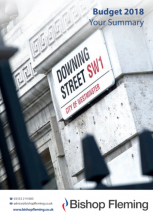Tax and Spend plans of the new PM
 Businesses may get a tax boost under new Prime Minister Boris Johnson, if his recent campaign pledges are followed through. He wants to boost the economy with the help of his new Chancellor
Businesses may get a tax boost under new Prime Minister Boris Johnson, if his recent campaign pledges are followed through. He wants to boost the economy with the help of his new Chancellor
In the hustings for the leadership, Prime Minister Johnson made a number of promises on tax and spending that we wait to see materialise, though with Parliamentary arithmetic as it stands and an unresolved Brexit issue, any tax and spend plans may have to wait until after 31 October (Brexit day), or maybe a general election, but could be announced before then.
The next 100 days will see some key tax and spend pledges progressed, or at least clarified for an election manifesto.
There is the possibility of a general election in September or October, but this may be preceded by an emergency Budget which has already been pencilled in for the week of 7 October, according to media reports.
There is also the distinct possibility of a further extension to the Brexit date, particularly if an election were to be called.
What has been said on tax?
It was made clear during the leadership campaign that austerity was at an end and it was time for an injection of money into the economy, which has suffered from the paralysis over leaving the European Union.
Both Boris Johnson and Jeremy Hunt made promises on tax cuts, and Johnson said in his victory speech that he might pinch some of Hunt’s ideas.
Income Tax
Johnson has pledged to give a tax cut to higher earners by raising the threshold at which people pay 40% tax from £50,000 to £80,000.
Following criticism about favouring more wealthy taxpayers, Johnson downgraded the pledge to an “ambition” and added that this would be part of a "package" of measures designed to reduce the tax burden for both low and middle earners. He also remarked that “too many people are being dragged into the higher rates” of income tax.
National Insurance Contributions (NICs)
Johnson also said he would increase the NIC threshold, which currently kicks in at earnings of £8,632, to help lower earners. He did not say by how much he plans to increase the threshold. He did say: “We will bring forward a tax proposal ... that begins by lifting thresholds for those on lowest pay.”
If raised from £8,632 to £12,500 (the income tax threshold), as was suggested by Dominic Raab, the measure would cost £11 billion per year according to the Institute for Fiscal Studies (IFS). If the employer threshold was also changed, it would be £17 billion per year. Each time you raise the NICs threshold by £1,000 it costs £3 billion.
Corporation Tax
Jeremy Hunt promised he would cut Corporation Tax from its current 19% (already dropping to 17% in April 2020) to just 12.5% - the same rate as in the Republic of Ireland.
This would make the UK’s tax rate more competitive with the rest of Europe (France has a corporation tax rate of 33%), though the value of any tax reliefs such as capital allowances would reduce as a consequence, and there have been no major calls for this tax to fall.
It will be interesting to see if Johnson goes down this path.
A low rate of corporation tax could encourage inward investment to the UK, which would help boost a post-Brexit economy.
VAT
Not an idea floated by Hunt or Johnson, but Michael Gove had suggested scrapping VAT and replacing it with a sales tax. This could actually increase costs for businesses and consumers and is unlikely to happen, though post Brexit there are changes that could be made to VAT, such as making more products exempt from the tax or changing the VAT registration threshold for traders.
Business Rates
The government has long promised a review of business rates and many trade groups have called for a route and branch reform of the tax. A future business-friendly Budget could finally announce a review.
Employment taxes
A tax that needs looking at is the apprenticeship levy, which was well intentioned but has not been executed very successfully. The levy pool of money collected from the tax has not been accessed by employers as much as it could have been.
The PM has also promised to deliver a higher living wage.
Stamp Duty
Johnson has said that he plans to raise the Stamp Duty Land Tax (SDLT) threshold from £125,000 to £500,000 and also reduce the top level of SDLT from 12% to 7%.
Tax reliefs
Johnson has promised to change the tax rules to incentivise investment in areas such as Research & Development and capital expenditure. We await the details on this.
Some of these changes may be dependent on not being bound by EU state aid rules. The current government/EU withdrawal agreement, which has not been approved by Parliament, retains the EU state aid rules.
If there is a no-deal Brexit, these EU rules would presumably no longer apply and the government would be free to make the tax changes it wants.
Spending Pledges
The government’s spending taps appear to be about to be turned on by the new government, signalling an end to austerity. If the UK were to leave the EU without a deal, the Treasury has already signalled that money would have to be pumped into the economy to protect it from any adverse effects.
This happened after the 2008 financial crash, when the Treasury pumped £435 billion of quantitative easing into the economy to shore up the banks.
Education
Johnson says there is a "need to be increasing our spending on education around the country". He has promised a "minimum funding level".
If he were to reverse the per-pupil cuts since 2015, that would cost £1.8 billion according to the IFS. If he were to reverse all of the cuts since 2009, that would cost £3.8 billion.
Johnson is understood to want every secondary school to spend at least £5,000 per pupil. Under the government’s current spending plans, secondary schools are already supposed to get a minimum of £4,800 per pupil.
Boris Johnson called the funding gap between some schools in cities compared to those in rural areas a “disturbing reality”.
Policing
Johnson agreed with Home Secretary, now Chancellor, Sajid Javid's call for an extra 20,000 police officers. The IFS says this will cost about £700 million. The IFS says that each 1 per cent increase in the police budget costs £130 million.
Social care
This is a really key issue for the new government. Both David Cameron and Theresa May tried to tackle this thorny issue but without success.
On social care, Johnson says it will be a "top priority".
As a guide, the IFS says a 1 per cent increase in social care spending in England costs around £160 million. To keep pace with inflation you would have to double that.
Some kind of insurance scheme may be introduced to help solve the social care crisis.
In his speech on the steps of 10 Downing Street, the PM said:
"My job is to protect you, or your parents, or grandparents from the fear of having to sell your home to pay for the costs of care." He added that he'll "fix the crisis in social care once and for all."
Infrastructure etc
Whilst not providing any details, Johnson has promised a "big program of transport infrastructure”, including money for the West Midlands, Northern Powerhouse Rail, and roads.
There could also be big spending around high speed broadband for all, reducing interest on student loans, increasing defence spending and protecting free TV licences for pensioners. Boris Johnson has an enthusiasm for the grand project, so expect to see some big ideas for infrastructure spending.
The new Chancellor of the Exchequer
Sajid Javid is the new Chancellor. He used to be a banker and also served under former Chancellor George Osborne for two years. Whilst Home Secretary he was known as a keen spender of public money, which fits in with the PM's desire to open the Treasury coffers in a post austerity landscape.
In an article Mr Javid wrote ten years ago, he said he would like to:
- Slash corporation tax rates (to 12.5%)
- Burn regulations
- Give automatic relief from Business Rates for all small businesses of a certain size
- Repeal "the silly IR35 tax on providers of personal services”
We await his first Budget with interest. It is rumoured that he is looking at proposals to spend up to £100 billion on infrastructure.
by Gary Mackley-Smith






